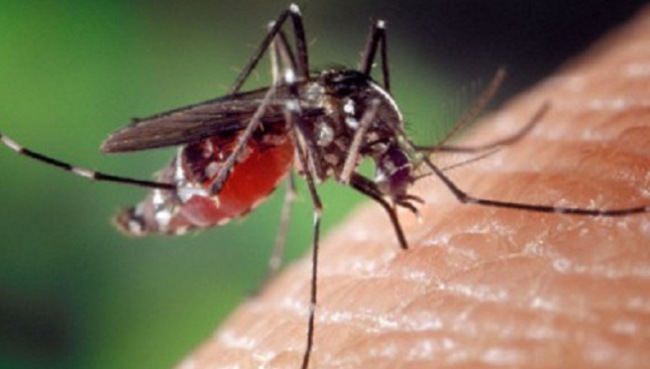The Massachusetts Department of Public Health (DPH) today announced that laboratory testing has confirmed a case of Eastern Equine Encephalitis (EEE) virus infection, in a male over the age of 60 who was exposed to the virus in northern Franklin County. This is the third human case of EEE in Massachusetts this year. The risk level in two communities in Franklin County has been raised to critical as a result. In addition, one horse from Mendon and one horse from Uxbridge have also tested positive for the EEE virus, raising the risk level to critical in two additional communities in Worcester County.
The four communities now at critical risk are Heath and Colrain in Franklin County, and Mendon and Uxbridge in Worcester County.
Earlier this week, DPH and the Department of Agricultural Resources (MDAR) announced aerial spraying in specific areas of Worcester and Middlesex Counties scheduled to begin Sunday August 25, weather permitting, continuing for several evenings. As a result of the elevated risk in several communities, the spray zone is being expanded. The additional communities either partially or fully in the spray zone are Blackstone, Douglas, Dudley, Holliston, Hopedale, Mendon, Millville, Oxford, Uxbridge, and Webster.
Additionally, MDAR is currently conducting a second round of aerial spraying in areas of Southeastern Massachusetts which began on Wednesday, August 21 and is expected to continue through the weekend.
Residents are encouraged to visit the DPH website at www.mass.gov/guides/aerial-mosquito-control-summer-2019 for the latest updates on spraying in their communities.
“We are seeing the most intense level of EEE activity that we have in several years. The largest area is in Bristol and Plymouth Counties with a second focus of activity in parts of Worcester and Middlesex Counties,” said Public Health Commissioner Monica Bharel, MD, MPH. “We are urging people across the state to remember that the peak time for transmission of mosquito-borne illness extends through September here in Massachusetts.”
In total across Massachusetts, there are 23 communities now at critical risk, 22 at high risk, and 52 at moderate risk for the EEE virus.
DPH is working with several state agencies including MDAR, local boards of health, local Mosquito Control Projects, and other mosquito control experts on mosquito surveillance and appropriate public health response activities.
All residents throughout the Commonwealth should continue to use mosquito repellent and those in high and critical risk communities should consider staying indoors during the dusk to dawn hours to reduce exposure to mosquitoes.
EEE is a rare but serious and potentially fatal disease that can affect people of all ages. EEE occurs sporadically in Massachusetts with the most recent outbreak years occurring from 2004-2006 and 2010-2012. There were 22 human cases of EEE infection during those two outbreak periods with 14 cases occurring among residents of Bristol and Plymouth Counties.
EEE virus has been found in 330 mosquito samples this year, many of them from species of mosquitoes capable of spreading the virus to people.
People have an important role to play in protecting themselves and their loved ones from illnesses caused by mosquitoes:
Avoid Mosquito Bites
Apply Insect Repellent when Outdoors. Use a repellent with an EPA-registered ingredient (DEET (N, N-diethyl-m-toluamide), permethrin, picaridin (KBR 3023), oil of lemon eucalyptus [p-methane 3, 8-diol (PMD)] or IR3535) according to the instructions on the product label. DEET products should not be used on infants under two months of age and should be used in concentrations of 30% or less on older children. Oil of lemon eucalyptus should not be used on children under three years of age.
Be Aware of Peak Mosquito Hours. The hours from dusk to dawn are peak biting times for many mosquitoes. Consider rescheduling outdoor activities that occur during evening or early morning in areas of high risk.
Clothing Can Help Reduce Mosquito Bites. Wearing long-sleeves, long pants and socks when outdoors will help keep mosquitoes away from your skin.
Mosquito-Proof Your Home
Drain Standing Water. Mosquitoes lay their eggs in standing water. Limit the number of places around your home for mosquitoes to breed by draining or discarding items that hold water. Check rain gutters and drains. Empty unused flowerpots and wading pools and change the water in birdbaths frequently.
Install or Repair Screens. Keep mosquitoes outside by having tightly-fitting screens on all of your windows and doors.
Protect Your Animals
Animal owners should reduce potential mosquito breeding sites on their property by eliminating standing water from containers such as buckets, tires, and wading pools – especially after heavy rains. Water troughs should be flushed out at least once a week during the summer months to reduce mosquitoes near paddock areas. Horse owners should keep horses in indoor stalls at night to reduce their risk of exposure to mosquitoes. Owners should also speak with their veterinarian about mosquito repellents approved for use in animals and vaccinations to prevent WNV and EEE. If an animal is suspected of having WNV or EEE, owners are required to report to DAR, Division of Animal Health by calling 617-626-1795 and to the Department of Public Health (DPH) by calling 617-983-6800.
For the most up-to-date information available on spraying locations, visit the Massachusetts Department of Agricultural Resources Aerial Spraying Map: https://massnrc.org/spray-map/
For other updates, Q&As, and downloadable fact sheets in multiple languages visit the DPH webpage www.mass.gov/guides/aerial-mosquito-control-summer-2019
Information including all West Nile virus and EEE positive results can be found on the Arbovirus Surveillance Information web page or by calling the DPH Epidemiology Program at 617-983-6800.
 New Bedford Guide Your Guide to New Bedford and South Coast, MA
New Bedford Guide Your Guide to New Bedford and South Coast, MA







